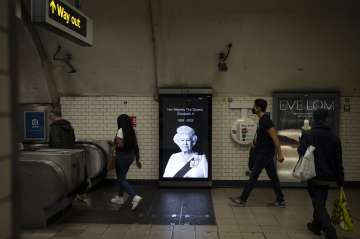Queen Elizabeth II death: Sukumar Mukherjee, secretary of the trust that takes care of Jallianwala Bagh Memorial here, remembers when Queen Elizabeth II visited the scene of the 1919 massacre, paying tribute to the dead but stopping short of offering an apology.
The British monarch, who died Thursday after a 70-year reign, visited Jallianwala Bagh in 1997 to pay homage to those killed in the firing ordered by a British Army officer. Many expected her to offer an apology then on behalf of her country. That didn’t happen. Instead, an insensitive remark reportedly made by Prince Philip, who accompanied her to the memorial, upset many Indians.
But Mukherjee said the visit itself was significant. "I think when she came to the Jallianwala Bagh here she paid respect to the martyrs and she also observed a minute of silence. It is not a minor thing that the Queen of a country does that and I think it was more than an apology," he told PTI on Friday.
But for Mahesh Behal, whose grandfather Lala Hari Ram Behal was killed at Jallianwala Bagh, the gesture amounted to nothing.
"The visit of the Queen in 1997 to Jallianwala Bagh was meaningless without her expression of apology. During her visit to the place of martyrs, she should have directly offered an apology but she never did so,” he said.
“When she arrived in India in 1997, a large group from the families of freedom fighters from Amritsar went to Rajghat in Delhi, where we all sat on a hunger strike and said that without an apology her visit to Amritsar will remain meaningless," recalled Behal.
On Baisakhi Day 1919, soldiers under the command of Colonel Reginald Dyer opened fire on a gathering calling for independence. Hundreds died, but estimates of the actual number vary.
During the royal couple’s 1997 visit to Jallianwala Bagh, Prince Philip is reported to have tactlessly questioned the extent of the casualties. At a banquet earlier during that India trip, the Queen acknowledged the Jallianwala killings. “It is no secret that there have been some difficult episodes in our past. Jallianwala Bagh is a distressing example,” she said.
Her first trip to India was in 1961 and the second in 1983, when India hosted the Commonwealth Heads of Government Meeting (CHOGM) and she presented Mother Teresa the Order of Merit.
Her final visit in 1997 was to mark the 50th anniversary celebrations of India's Independence and for the first time she made the reference to “difficult episodes” of colonial history. Queen Elizabeth II, the UK's longest-serving monarch, died Thursday at Balmoral Castle in Scotland. She was 96.
In his tribute, Prime Minister Narendra Modi recalled his "memorable" meetings with the Queen in 2015 and 2018. "I will never forget her warmth and kindness. During one of the meetings she showed me the handkerchief Mahatma Gandhi gifted her on her wedding. I will always cherish that gesture," the prime minister said.
Also Read: Queen Elizabeth II death: One-day state mourning to be observed in India on September 11
Latest India News
